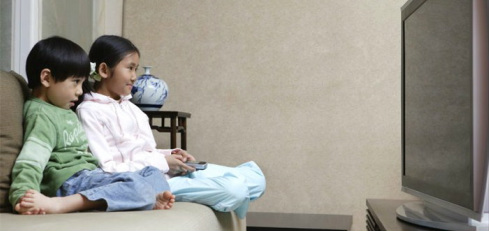|
My children are at the age that watching TV or movies is one of their favorite activities. The problem is that nearly everything they want to watch has some attitudes, language, or behavior that I don’t approve of. It also seems that these negative aspects are what my children remember most and tend to copy. How can I protect my children from that? Many parents today share the same concern. They realize the importance of monitoring and sometimes restricting what their children view and listen to, and certainly it is their right and responsibility to do so. At the same time, it is virtually impossible for parents to shield their children from every negative influence that comes their way. If the children don’t get exposed to these things via TV, movies, and computer games, they will through their peers or other avenues. You can’t always protect your children from the negative, but you can counter it. Here’s how: Make it a practice to watch with your children and to discuss the show with them afterwards, with the goal of helping them get the most positive and the least negative from the experience. This also gives you an opportunity to discuss problem attitudes or behavior from a third-party perspective—”What do you think that character should have done in that situation?” Over time, this will help your children form strong personal values, as well as teach them to be more selective in what they watch. It’s important to preview the material whenever possible, or at least read the reviews on it so you are aware of the content. This gives you a chance to make sure it is age-appropriate and otherwise suitable for your children. It also gives you time to think about what lessons or information can be gained. Think in terms of, “How can this benefit my children?” If you draw a blank, it’s probably not worthwhile for your children to watch. Gear both viewing and discussion to the age of the children. Videos have an advantage over “live” TV in that you can pause to answer their questions. So if you can, record shows and then show them to your kids later. (That way you can also skip the commercials, which pitch some products you may feel would not be good for your children.) If young children are going to be scared or not understand certain parts, then stop and explain or fast-forward. Older children usually prefer to watch the movie straight through and have the discussion afterwards. In your discussion, the objective is to get the children to think about what they have just watched, and to help them arrive at more mature conclusions than they would on their own. Children learn better by asking questions and thinking things through than they do when all the answers are supplied too quickly. Also, they tend to more readily accept guidance when it comes in the form of answers to their questions or thought-provoking questions that you put to them, than they do when they feel they are being “preached to.” As you watch, you may also want to make note of points that you could use as springboards for more fun, positive, educational interaction with your children, such as reading more about historical figures, places, events, or activities depicted in the show, or taking them for an outing that somehow relates to the show. You just might be surprised at how much your children can benefit from movies and documentaries with a little guidance. They can learn about life and human nature; they can learn how to deal with crises and hardships; they can learn to empathize; they can see that bad choices have consequences, and thus learn from others’ mistakes. So while potentially harmful if not properly channeled, movies and TV can actually be a good teaching tool and bring your family closer together if used selectively. Excerpted from Activated magazine. Used with permission.
0 Comments
Leave a Reply. |
Categories
All
Archives
March 2024
LinksFree Children's Stories |


 RSS Feed
RSS Feed
